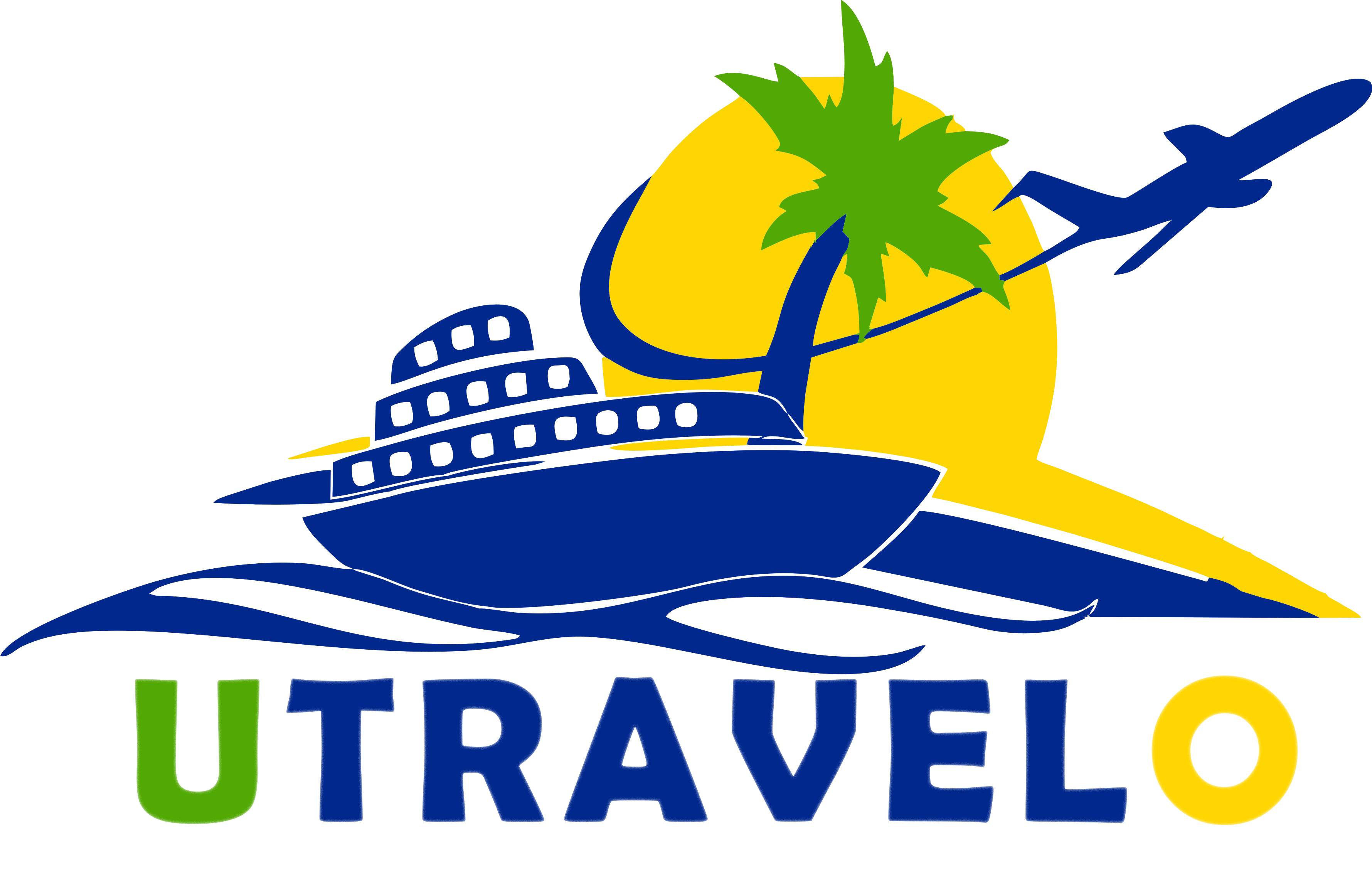This is how Guerneville came to be known as the most alternative region in the Northern California wine industry.

A little community in Sonoma County that is just as gay as the Castro may be found about an hour and a half north of San Francisco, along the Russian River, and surrounded by towering redwood trees. Guerneville, California, which was formerly an industrialized hub for logging, is now a genuine Fire Island for wine region and the Bay Area. It is a beautiful summer hideaway that has become a must-visit place for gay travellers who are in the know.
It is a town of less than 5,000 people, but it is home to an astounding number of queer businesses and events, such as the summer's wildly popular Lazy Bear Week (a spree of pool parties and events geared towards the gay bear community) and a wine-tasting room that is co-owned by the civil rights activist who helped legalise same-sex marriage. Both of these events are held in the town. Additionally, there is an enduring sense of pride that has turned Guerneville from a summer retreat into an oasis that is open throughout the year.
Guerneville is a town in Sonoma County that has managed to maintain its bohemian character despite its distance from the more fashionable surrounding towns. Guerneville goes in the other direction of what the rest of the region does, despite being only a few minutes away from wine country and being home to the magnificent Korbel Champagne Cellars. It offers a more easygoing come-as-you-are feel without any pretence, in addition to a sunny nature escape with riverbank beaches and woodland walks. Come as you are.
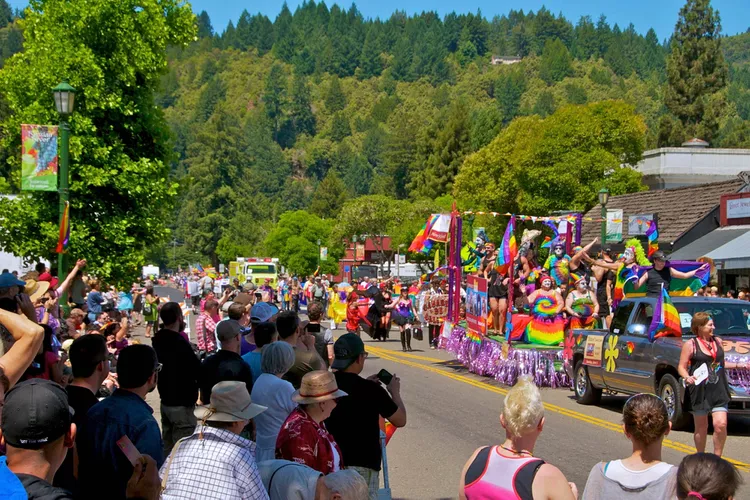
Due to the large number of felled redwood trees in the area when Guerneville first began to develop as a logging town in the late 1800s, the town earned the nickname "Stumptown." After the conservationist James Armstrong took action to save the all-natural skyscrapers, loggers were gradually replaced by vacationers. Many of these visitors travelled all the way from San Francisco to take pleasure in the picturesque forests and swim in the river.
It wasn't until 1976, when California's sodomy laws were overturned, that the town became a hotspot for LGBTQIA+ people, who were drawn to by the town's year-round sunshine and its relatively inexpensive housing options. Following the devastation caused by a series of floods in the 1960s, there was an abundance of resorts available for purchase, which provided LGBTQIA+ business owners with the opportunity to leave their mark on the town.
Peter Pender, a pioneering gay man who created Guerneville's first gay resort, Fife's, in 1978, was one of the businesspeople that fell into this category. Because of its popularity, there was a surge in the number of gay-owned companies and overnight stays. The Woods, a gay-owned hotel with cottages, cabins and a clothing-optional pool; The R3 Hotel, known for its pool parties and women's weekends; and Rainbow Cattle Company, a homosexual dive bar that still draws customers with its dazzling rainbow front on Main Street. These are some of the establishments that can be found in the area.
In 1979, the dive bar, which is one of the only remaining businesses from Guerneville's earlier queer days, opened its doors to the public. In order to protect itself from being egged by homophobic customers passing by, the bar's windows were boarded up. According to Bob Frederick, who moved to Guerneville from San Francisco and started going to the Rainbow in 1981 and later became a part-owner there, this is the case. Frederick subsequently bought into the business. According to what he shared with Travel + Leisure, Rainbow Cattle Company has long been regarded as a pillar of the community. "Being a gay bar on Main Street, our neon sign out front is the first sign they see when they come into town."
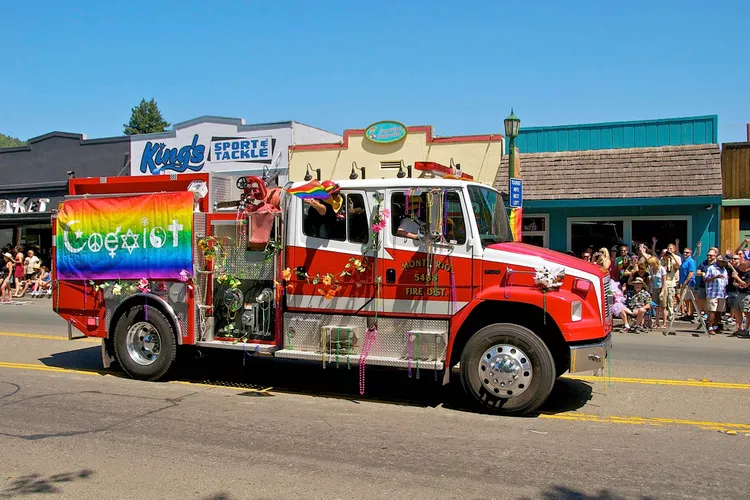
Rainbow Cattle Company has been successful in the face of the failure of other gay-owned businesses, such as the original Fife's, which is now known as Dawn Ranch. This is due to the establishment's warm and inviting atmosphere, as well as charitable events such as Give Back Tuesday. Charity is a key throughline for Guerneville's gay businesses, helping to generate a domino effect for other businesses with a similar mission to follow in its footsteps. Similar to other charitable organisations, such as the Equality Vines tasting room and Lazy Bear Week, both of which donate proceeds to local nonprofits, charity is an important throughline for Guerneville's queer businesses.
Bodega Bay is a picturesque town in Sonoma County #California just north of San Francisco.
— Retro Highway (@RetroHighway) May 5, 2023
It's an outdoor paradise with beach hiking, whale watching, birding- and has been the scene for many movies filmed. Have you been to Bodega Bay? pic.twitter.com/VuC3osv4Cm
Crista Luedtke was another early user of the Guerneville style, just as Frederick. When she first started spending her weekends in Guerneville, she was working as a mortgage broker in San Francisco. She was originally from the Midwest. When she made the decision to switch careers to hospitality, the community met all of her requirements as a welcoming space for LGBTQ people.
"I wanted to be able to afford it on my own, be within two hours of San Francisco, and be in wine country," she tells Travel + Leisure. "Healdsburg was similar to Aspen in that it was out of reach financially and a bit too yuppie. Guerneville was never far from my thoughts."
Her first venture was the acquisition of an older gay resort, which she and her ex-wife later transformed into the Boon Hotel + Spa and opened for business in 2008. After opening Boon Eat + Drink on Main Street the following year, she went on to create Big Bottom Market just down the street in 2011, cocktail bar El Barrio in 2014, and Brot, a restaurant with a German-inspired menu, in 2019. Luedtke has made a number of adjustments, such as transforming Boon Eat + Drink from a casual diner-style eatery into a contemporary Californian bistro, selling both Big Bottom Market and El Barrio, introducing drag brunch at Brot, and purchasing the woodsy Highlands Resort, all while influencing and developing a community with which she has long felt a kinship.
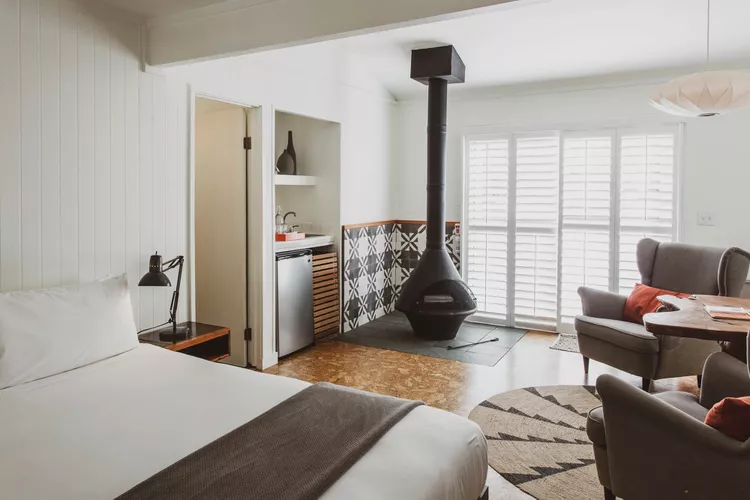
The myth of Guerneville as a gay-exclusive summer resort town has developed as a result of the contributions of trailblazers such as Luedtke. The town does not go into hibernation anymore, despite the fact that recurring yearly events such as the summertime Lazy Bear Week continue to be the busiest time of year. Luedtke comments on the transformation of the village, saying that "some locals weren't receptive right off the bat." "However, those were long-time residents of the area who are resistant to change, and this made it possible for doors to open and for people to comprehend that there is a scene and a demand there."
Once upon a time, the town's dining options were restricted to a small number of taco trucks and pizza shops that could only sustain summer traffic. These days, however, Guerneville's Boon Eat + Drink and Big Bottom Market both have lines that extend out the door due to the popularity of their biscuits, which have been recommended by Oprah. "People saw that this was truly a food destination, not just summer parties and gay bars, there was a thing happening here — a culinary scene and destination that didn't exist before," says Luedtke. "There was a thing happening here — a culinary scene and destination that there wasn't before."
Related link : Twenty of the Most Popular Attractions and Activities in Jerusalem
During his time living in San Francisco in the early 2000s, Michael Volpatt was another person who spent the weekend in Guerneville frequently. Despite the town's early reputation as a kind of free-spirited stepchild in wine country, the current owner of Big Bottom Market eventually moved to town and purchased a home there. He is also the proprietor of Big Bottom Market. "A lot of my friends were like 'You're buying a home in Guerneville?' at the time," he says to T+L. "You're buying a home in Guerneville?" "The main street was not as crowded as usual, a number of merchants were not there, and it was just kind of quiet overall. But I had this nagging feeling in the back of my mind that it was the next logical step.
Even though Rainbow Cattle Company is one of the few holdovers, it is the new generation that has been instrumental in helping to usher in this transition. "You witnessed the change in ownership," Volpatt said in his explanation. "The way businesses operated started to shift, which some people embraced while others opposed. "There was younger blood coming in and rethinking the way the town was being seen," and "the newcomers really started to get excited about what was happening in town,"
Along with the change in business came an increase in media coverage. "That helped to drive interest in the town as a destination, and also as a place to buy homes for people in the Bay Area that have all of this money," he adds. "That helped to drive interest in the town as a destination for people who have all of this money." "However, they are not interested in purchasing in Healdsburg; rather, they want this cool bohemian town that is conveniently located near the river, the redwoods, and the coast."
After relocating to Guerneville and establishing himself as a respected member of the local community, Volpatt began accompanying Luedtke on strolls among the redwoods, during which they discussed what was lacking and what was required. They were instrumental in bringing about the town's resurgence and completing the town's transformation into a year-round tourist attraction, which they helped to facilitate. The idea for Big Bottom Market came about when the owners wanted a sandwich store that served healthful food. Over time, biscuits were added to the menu, and they quickly gained a devoted following.
Then, after parting ways with Luedtke at the market in a cordial manner, he assisted Matt Grove and Jim Obergefell, both of whom are famous for their roles in the Obergefell v. Hodges case, in opening Equality Vines, an artsy wine bar that advertises itself as the "world's first cause wine portfolio." Together with local Sonoma wineries, Equality creates labels from which a portion of the proceeds is contributed to local grassroots non-profit organisations. These organisations include Face to Face Sonoma County and Senior Advocacy for Gay Elders.
Both Grove and Obergefell concur that there is something special about Guerneville that draws members of the LGBTQIA+ community here. Volpatt, who worked as a publicist for Obergefell around that period, was the one who suggested that they bring the brand to life in Guerneville. The year 2015 marked the beginning of the company, the year 2016 saw the production of the first bottle of wine, and the year 2017 saw the opening of the tasting room.
"I had a bias to Napa, I had never been to Sonoma that much," Grove said in an interview with T+L. "I had a bias to Napa." "As soon as I mentioned Napa, he exclaimed, 'I'm out. The Russian River Valley is the place to produce wine for the LGBT community, so come here if you're going to do it. After he explained the reason, which made perfect sense, I was on my way to meet some new winemakers on the same day. It seemed as though Guerneville had tracked us down on its own. It just felt natural. I had the distinct impression that we were in our community.
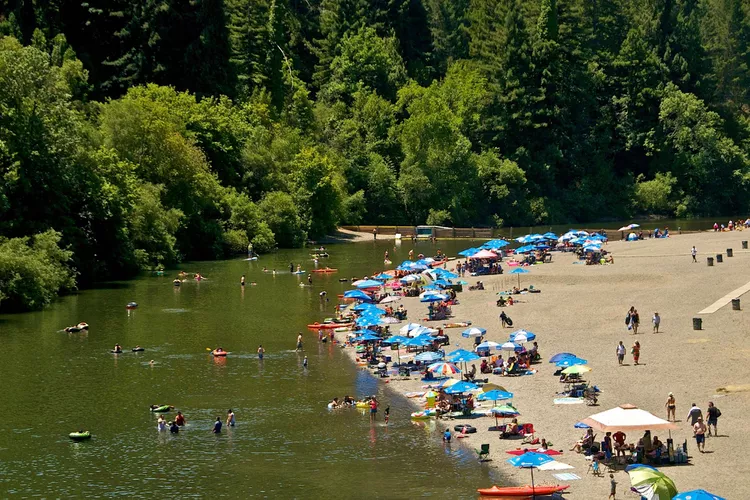
Guerneville appears to have a prosperous future ahead of it. Entrepreneurs with a progressive mindset feel that the town will keep its offbeat character, which will allow traditional stalwarts to thrive while also allowing newcomers to continue the inclusive legacy of the town. "I think Guerneville is proudly quirky, and I don't see it losing that," says Obergefell. "I don't see it happening." "There is potential for expansion, but I believe that Guerneville will maintain its identity as Guerneville even as it expands. It takes great pride in who and what it is, and the people who live there will do everything in their power to ensure that this continues.
Luedtke believes that this expansion was the result of a natural process of evolution, which also reveals no signs of slowing down. According to Luedtke, "an increasing number of people are becoming aware of what an incredible location this is." "There is such a vibrant art culture here, as well as beautiful antique boutiques. This is occurring because a significant number of these individuals are very recent arrivals. We are making an effort to continue to construct it.
